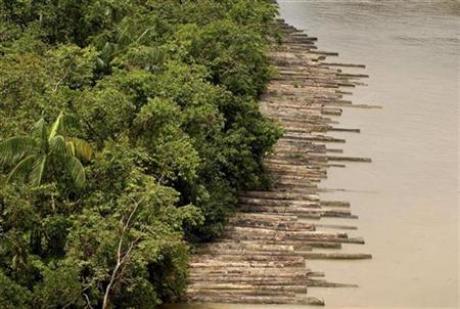Saving Nature, Economies At Stake In Japan U.N. Talks
Date: 18-Oct-10
Country: SINGAPORE/TOKYO
Author: David Fogarty and Chisa Fujioka

Illegally logged timber, which has been confiscated, is floated down
the Guamá River Delta in the northeastern state of Para April 14,
2010.
Photo: Paulo Santos
Envoys from around the world meet in Japan from Monday to try to combat the destruction of nature and to value properly the services of forests, coral reefs and oceans that underpin livelihoods and economic growth.
The United Nations says natural resources, or natural capital, are being lost at an alarming rate and urgent steps need to be taken to combat the destruction of plant and animal species that ensure mankind's survival.
Envoys will hold two weeks of talks in the Japanese city of Nagoya to try to win agreement on new targets and funding to help nations save and better manage vanishing ecosystems.
A treaty on sharing the genetic richness of nature between countries and corporations is also a central focus of the talks that are the culmination of years of negotiations.
Developing nations want a fairer deal in sharing the wealth of their ecosystems, such as medicines created by big pharmaceutical firms, and back the draft treaty, or "access and benefit-sharing" protocol. Failure to agree the pact could derail the talks in Nagoya, conservation groups say.
Drug firms in some rich nations are worried about how it will work in practice, for example, making it harder to get patents.
"Nagoya is a milestone," said the head of the United Nations' Environment Programme, Achim Steiner. "It's the most important attempt in a decade to tackle the issue of biodiversity and ecosystem services," he told Reuters.
The United Nations says countries must fully value the benefits ecosystems bring to economies, such as food, water, clean air and medicines.
Forests are a key source of fresh water and clean air and they help regulate the climate. Coral reefs and mangroves are crucial fish breeding grounds that support mulit-billion dollar fisheries, while also protecting coastlines from storms.
TARGETS
The meeting aims to set new 2020 targets to guide nations after governments largely failed to meet a 2010 target of achieving a significant reduction in biodiversity losses.
Nations will decide either to set a 2020 deadline to halt the loss of biodiversity or opt for taking action toward halting loss of plant and animal species, the draft text shows.
Under a 20-point plan, nations will consider goals covering greater protection of fish stocks, halving or halting the loss and degradation of natural habitats, phase out incentives harmful to biodiversity and conserve much larger land and marine areas.
But developing nations, which own much of the remaining richness of plant and animal species, want a 100-fold increase in funding to achieve these targets.
Steiner said talks about funding could become difficult.
He said rich nations benefitted from nature's riches in the oceans and forests elsewhere on the planet and should be willing to share the costs of protecting and restoring ecosystems.
"Otherwise it is a very unfair deal to save the world's biodiversity, with developing nations having to bear the brunt of the costs," he said.
But he said all governments must put policies and incentives in place to protect nature and that there was only about a decade left to take steps to drive government and business action.
For poorer nations, agreement on the protocol to share genetic benefits could unlock billions of dollars.
Some drug makers, though, are wary.
"A massive amount of money is already spent on research and development for pharmaceutical goods," said Yuji Watanabe, director of intellectual property at Astellas Pharma, Japan's second-biggest drugmaker.
"So additional costs such as in the form of royalties, would completely change the basis for companies' profitability. It could weaken the drive to develop new, improved drugs."
Steiner acknowledged the protocol was "a major frontier in international policy" because it challenged fundamental assumptions about how patents and intellectual property worked.
NATURE ON THE BALANCE SHEET
But the United Nations said putting a value on nature is the only way to make it visible to businesses to help them fully understand the costs of damaging or destroying it.
A U.N.-backed study this month said global environmental damage caused by human activity in 2008 totaled $6.6 trillion, equivalent to 11 percent of global gross domestic product.
The Nagoya talks also come during increasingly fraught U.N. climate negotiations. Lack of trust between rich and poor nations led to a non-binding climate deal in Copenhagen last year that left many gaps.
"We need a success. What we don't need is a second Copenhagen, that's for sure," Gunter Mitlacher, biodiversity director for WWF Germany, told a briefing in Tokyo on Thursday.
(Editing by Robert Birsel)